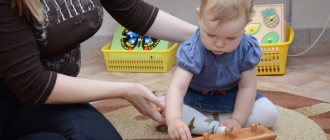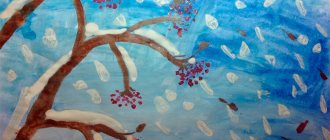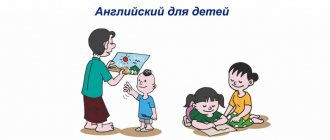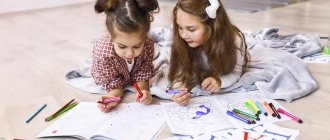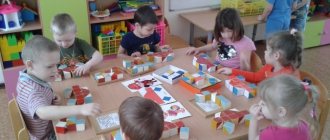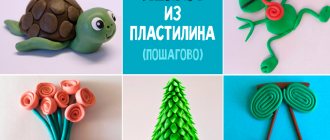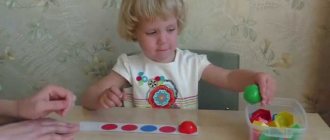About food
Yes, speaking of food! All three-year-olds are gourmets! By this time they have decided on what they like and especially what they don’t like. Now is the time to ask them about their culinary preferences.
- What's your favorite thing to eat for breakfast? What about lunch? What about for dinner?
- What's your favorite snack? What kind of treats do you like?
- Do you like salty or sweet more?
- What would you like to try cooking with me?
- What food do you dislike the most?
About animals
When a child learns about animals, he not only learns what sounds they make and what they look like, but also gets acquainted with aspects of his native culture, because in children's books, animals are often the main characters who convey some idea and show how things work. the world around him. So animals are an inexhaustible topic of conversation.
- What's your favorite animal? Why?
- Where do ducks live?
- What does the pig say?
- What animals live on the farm? And in the forest?
- What animal would you like to become?
A file of conversations on a healthy lifestyle in the first junior group.
A file of conversations on a healthy lifestyle in the first junior group.
Contents: “Secrets of health” “I love vitamins, I want to be healthy” “We must, we must wash ourselves in the mornings and evenings” “Let’s help Piggy become neat” “Ethics of nutrition in kindergarten” Conversation No. 1 Topic: “Secrets of health”
Goal: To form an idea of health, to highlight the rules of cultural and hygienic behavior.
Material: fruits, vegetables cards, plate. Progress of the conversation: The teacher gathers the children and informs them that Aibolit has arrived at the kindergarten, he is visiting groups and talking with the children, and will now come to them. Aibolit: Hello, children, I came to see you - what are you like, are you healthy? I want to tell you about the secrets of health. Health must be protected. So I ask you: how do you take care of your health? What do you do to avoid getting sick? Why are you silent? Do not know? Educator: They know that health is exercise, rosy cheeks, this is when we are strong, dexterous, brave and cheerful, this is when we are friends with vitamins. Aibolit: Correct. (To children) Have any of you taken vitamins? Vitamins make our body strong and healthy, resistant to disease. But vitamins come not only in tablets, they also grow on branches. Educator: The guys and I know that fruits grow on branches and vegetables in the garden. Many vitamins are found in fruits and vegetables. Educator: The guys and I know that fruits grow on branches and vegetables in the garden. Game "Fruits and vegetables" Children put fruits and vegetables on different plates. Aibolit: I’ll tell you a secret, to be healthy, you need not only to eat vitamins and be strong! You definitely need to wash in the morning, evening and afternoon - before every meal, after sleep and before bed! What if you have a child who doesn’t really know how to wash himself? Educator: I’m sure that we don’t have such children, dear Aibolit. Aibolit: How can I check this? I came up with an idea, you guys should answer my questions. You decide to wash your face. What is needed for this? (Water, soap, towel.) -How should you open the water tap correctly? So that the splashes fly in all directions? -What should you do first before going to the water tap? (Roll up your sleeves so as not to wet your shirt or dress.) Teacher Show how to roll up your sleeves. Like this. How should you wash your hands? Educator: All that remains is to turn off the tap and hang the towel in place. Aibolit Yes, indeed, all children know how to wash themselves properly. Well, we can only praise them for this. The most important secret of health is to play sports and do exercises every morning. Aibolit I have prepared a surprise for all of you guys. Today you will receive a glass of vitamin juice from me in order to grow strong and healthy. And before I leave, I want to wish you health and remember all the secrets of health. Result: Guys, it’s time for Aibolit to leave for another group, let’s say thank you to him for telling us about the secrets of health. And now we will try to remember what we need to do to be healthy? Do exercises; Eat vitamins; Wash your hands before eating; Behave politely at the table. Conversation No. 2 Conversation on the topic: “I love vitamins, I want to be healthy”
Goal: To reinforce in children the names of some vegetables and fruits;
expand children's understanding of how healthy many foods are and how important it is to eat right. Material: dummies of fruits and vegetables. Course of the conversation: The teacher asks the kids: - Guys, do you like vitamins? What vitamins do you like? (children's answers) Who gives you vitamins? (most likely, the children will name one of the family members, a teacher or a nurse) Where do mom (or others) buy them? Listen, analyze and summarize the children’s answers. Next, the teacher informs the children that vitamins are not only sold at the pharmacy in beautiful packaging, but are also found in the foods we eat. The teacher draws the children’s attention to dummies of fruits and vegetables: “Look, kids, what do I have?” (children's answers) Do you know how many vitamins they contain! Here you go, raise your hands, those kids who love carrots. Well done! Please clap your hands for those little ones who love lemon. Well done! Please, those who love oranges, stomp your feet. Well done! Oranges help with colds and sore throats! Well, it’s better to eat lemon, even though it is very sour. Eat more oranges, drink delicious carrot juice, and then you will definitely be very slim and tall. There are no healthier products - Delicious vegetables and fruits. - But you know guys, vitamins are found not only in vegetables and fruits, but also in other foods. It is very healthy to eat porridge with butter, honey, fish contains many vitamins, you should definitely eat meat. Berries are also rich in vitamins. What berries do you know? (children's answers) - You see, kids, how many benefits vitamins have! Therefore, eat the vitamins that are bought for you at the pharmacy. But, and most importantly, eat well so as not to get sick, grow healthy and smart! Finger game "Pies". One, two, three, four They deftly kneaded the dough. We rolled out the circles. And they made pies, Pies filled with Sweet raspberries, Carrots and cabbage, Very, very tasty. They took it out of the oven and began to treat everyone. The house smells like pies... Bottom line: -What should you eat to be healthy? -Where are vitamins found? Conversation No. 3 Topic: “We must, we must wash ourselves in the mornings and evenings”
Goals: To develop healthy lifestyle skills and develop physical activity.
Material: soap, pictures of animals and birds. Progress of the conversation. Children with a teacher sit in a circle on the carpet, and Aibolit (a glove doll) comes to visit them. Aibolit: Guys, while I was walking to you, I met Moidodyr. He told me a story about one boy who didn’t bathe, didn’t wash, and was dirty. Educator: Doctor, we know who you are talking about, the guys and I read about this boy. The teacher and the children remember and read excerpts from the work “Moidodyr” by K. Chukovsky. Aibolit: Are there dirty people in your group? Do you all love water? What do you do when you wake up? Children answer questions. Aibolit: Well done! You made me happy! I have a gift for you! Doctor Aibolit gives soap to children. Leaves. The teacher continues the conversation with the children about animals and how they wash themselves. -1070610-729615 Early in the morning at dawn, little mice, and ducklings and kittens, and bugs and spiders, wash themselves. You were the only one who didn’t wash your face, And you were left dirty, And you ran away from the dirty stockings and shoes. Teacher: - All animals and insects love to swim and wash. Guys, how many of you have seen them wash themselves? How does a cat wash itself? Children: - Paws and tongue. Educator: - That's right, how does a dog wash itself? Children: -Also with paws and tongue. Educator: - Who knows how an elephant bathes? Children: - Trunk. Educator: - Well done! An elephant can make a shower for itself with its trunk. The hamster washes itself with its paws. A parrot cleans its feathers with its beak. Children are offered a game - an imitation of “How animals, birds, insects wash themselves” - pictures of animals and birds. Educator: - Well done! Guys, is the person washing his face? Children: - Yes. -Educator: Why does a person wash his face? Children: To be clean, beautiful, neat, smell good. If children find it difficult, the teacher helps. Educator: Correct! And also to avoid getting sick. Harmful microbes accumulate on our body, we do not see them. Therefore, you need to wash and take care of yourself, even if you are not very dirty. A person washes his entire body when he bathes in a bath, under a shower, or he can wash his hands, face, and feet separately. Everyone loves to swim: people, animals, insects, and even toys we wash. Well done to you and we will definitely stay healthy! Result: -What did we talk about today? -What should you do to avoid getting sick? Conversation No. 4 Topic: Let’s help Piggy become neat”
Goal: to develop interest in performing cultural and hygienic skills;
Encourage children to constantly perform them. Material: soap, towel, Progress of the conversation: 1. Surprise moment Educator: oh, guys, do you hear? Someone is still in a hurry to visit us! Let's put all the toys back in their place and see who came to us. Piggy appears on the screen - all dirty, shaggy, crying a lot. Educator: So this is who came to visit us! Hello, Piggy. What happened to you? Are you sick? Why are you crying? Piggy: Hello, guys! I'm very sad. Today I went out into the yard and wanted to play with my friends. But no one wanted to play with me, everyone moved away from me... (crying) Teacher: interesting! Guys, why do you think his friends didn’t play with Piggy? Children: he is dirty, unkempt, not beautiful, not neat…. Teacher: of course, because he is untidy! he needs help urgently. Piggy: and they also gave me this bag, and said that the things that were there would be very useful to me. Look here? Guys help me, please! Piggy gives the bag to the teacher and the children and asks them to help him. Educator: Shall we help the kids Khryusha? Children: yes. Educator: then let’s sit down on the chairs, and you, Piggy, listen to us carefully and remember everything! 2. Game “Wonderful Bag” The game “Wonderful Bag” is played. Educator: guys, let's see what's in the bag. Look, what is this? (Soap.) It smells so delicious. What soap? (Scented, white, round.) Who will tell Piggy why soap is needed? The child (optional) tells, the teacher helps (Soap is needed to wash: wash your hands, face, neck and whole body so that they are clean). Piggy: Oh, guys, how do you wash your hands? Please show me! Educator: what do the guys need to do first? Children: roll up your sleeves. Educator: that’s right, look, Piggy, and remember: The teacher and the children imitate hand washing: Hands must be washed with soap, Sleeves must not be wet. Whoever doesn't roll up his sleeve won't get any water. We need, we need to wash ourselves, where is the clean water? Let's open the tap: Sh-Sh-Sh, Wash our hands: Sh-Sh-Sh, We'll rub our cheeks, neck. And pour some water on it. Piggy: How great! -1070610-729615 Educator: Oh, our hands are wet! What do we need to make our hands dry? (Towel.) Children pick up an imaginary towel and “wipe” their hands. Come on, Piggy, let's see, is there a towel in your bag? Of course there is. Here it is! What towel, guys? (Beautiful, soft, fluffy, colorful) The teacher invites the children to take the last item out of the bag and also talk about it (comb): This is a comb. It is wooden (plastic, long, it has a handle and teeth. We need a comb to comb our hair like this (the child shows Piggy, imitating the combing movements, how to comb it). Educator: well, Piggy, now you understand what they are for these items? (hands the bag to Piggy) Piggy: I understand, I understand what needs to be done with these items! Now I know how they can help me! Guys, please, just don’t go anywhere, I’ll fix everything now... Behind the screen Piggy appears, all clean, combed, neat and tidy. Piggy: Guys, guys! Now I know exactly why no one wanted to play with me! Remember what I was like? (Children list: dirty, unkempt, grimy, sloppily dressed, unkempt). And now what am I? (clean, beautiful, tidy, etc.) I really liked washing myself, drying myself with a towel, brushing my teeth, combing my hair. Thank you very much for your help, now I have so many friends who want play with me. I want to give you their portraits so that you can color them and keep them as a souvenir. 5. Productive activity Piggy gives all the children portraits of his friends to color. Well, it’s time for me to run, my friends are waiting. Thanks guys. Goodbye! Teacher and children: goodbye! Educator: It’s great, guys, that you and I helped Khryusha. Let's now take pencils and color all his friends Conversation No. 5 Topic: “Ethics of nutrition in kindergarten”
Tasks: continue to teach children personal hygiene,. introduce to basic generally accepted norms and rules of relationships with peers and adults; Materials: toy – “Pinocchio”, children’s dishes, cards for activities: “Bread”. Progress of the conversation: Children are sitting on chairs. Educator: Guys, we have guests today, let’s say hello to you and play a game. Children imitate movements and repeat after the teacher. Good morning, eyes, did you wake up? (look through binoculars) Good morning, ears, are you awake? (lightly rubs ears) Good morning, did you wake up? (clapping) Good morning, legs, are you awake? (stomp) Good morning sun We woke up and smiled at each other. Guys, we will have breakfast with you now. Tell me, who cooks our food? Children: Cook. Who brings us food? Children: Bella Kirimovna (junior teacher) Children, why do we need food? Children: To be strong, strong, never to get sick, to get vitamins for the body. Tell me, who cooks our food? Children: Cook. Who brings us food? Children: Bella Kirimovna (junior teacher) Children, why do we need food? Children: To be strong, strong, never to get sick, to get vitamins for the body. Put Violetta and Roman on duty - bread bins, napkins. And then come back to us. Children look at the pictures and answer leading questions. The cook guys also prepared porridge for us, the porridge is very healthy, it comes in semolina, rice, buckwheat, and boiled in milk. Come on, come on, come on, zeros! Don't grumble the pots, Don't grumble, don't hiss, cook sweet porridge, Cook sweet porridge, feed our children. And finally, both adults and children love tea. Guys, tell me how we should behave at the table? Children: Calm down, don’t push, don’t talk, etc. Listen, I have this poem. Don't spill hot soup or tea on yourself. Be careful when your food is hot. Eat calmly, don’t fidget, don’t hover over the plate. Eat calmly, don’t fidget, don’t hover over the plate. Yes, guys at the table, we must sit calmly, watch our posture, and hold the spoon correctly. The Buratino toy appears. Doesn't behave properly at the table. Everyone makes comments. Now, let's show Pinocchio how we should behave at the table. But before that we must wash our hands. Why wash your hands? Let's listen to poetry. Children recite poems. The mouse did not wash its paws well, only moistened it with water, did not try to wash it with soap - and the dirt remained on its paws. A towel with black spots, how unpleasant it is! Germs will get into your mouth and your stomach may hurt. So, children, try to wash your face with soap more often! You should wash your hands with warm water before eating. We go at a calm pace to wash our hands and then have breakfast. The children wash their hands and sit down to have breakfast, the teacher wishes you a bon appetit, pays attention to how the children are sitting at the table, and what is for breakfast today. Result: -How should you behave at the table? -What should you do before eating? -How should you sit at the table?
About the world around us
Children often start talking random nonsense when you go somewhere, or ask a ton of questions when you are wildly late. Take the initiative into your own hands and start asking questions yourself - this will distract the child a little, and you will learn a lot of new things.
- What do you see around?
- Do you think it will rain today?
- Don't you think this cloud looks like you?
- What color are these birds? How do they sing?
- Are there a lot of people on the street today or not so many, what do you think?
About friends
Most likely, your child has already made his first friends from among his classmates in the kindergarten or playmates and playgrounds. Talk to him about them.
- Who is your best friend?
- Are you a good friend?
- Do you like to play with your friends in turns and not fight?
- What should friends do for each other?
- What's your favorite thing to do with friends?
PS Of course, this is only an approximate list of questions that you can change and transform according to your situation, feelings and taste. With this list we just wanted to show that there are quite a few topics that can be discussed even with a small child. We hope we've inspired you a little!
Why does a 3-4 year old child behave badly?
There can be many reasons for bad behavior. Child psychologists identify the main reasons that you should pay attention to.
- The child attracts the attention of adults. When parents are constantly busy and cannot devote time to the baby, he wants to attract attention by any means. Since a three-year-old does not yet know how to build a constructive dialogue, he begins to behave badly, be capricious, and cry. Let mom and dad scold me, but they’ll drop what they’re doing and take care of me.
- The baby is asserting itself. From about two years old, the baby begins to show independence. Surely moms and dads remember the endless repetition: “I myself,” “I myself.” Parents consider a three-year-old child to be small and try to take care of him in every possible way. And the three-year-old resists parental control, including through disobedience.
- The child takes revenge on his parents. Whims, hysterics, screams can be revenge for an insult caused by mom or dad. Parents may not even realize that they have hurt the baby. For example, my mother forced me to finish eating tasteless porridge, and my father took my tablet and forbade me from watching cartoons.
- Low self-esteem. If a child is disappointed in something, has lost faith in himself, he may behave aggressively and inappropriately.
